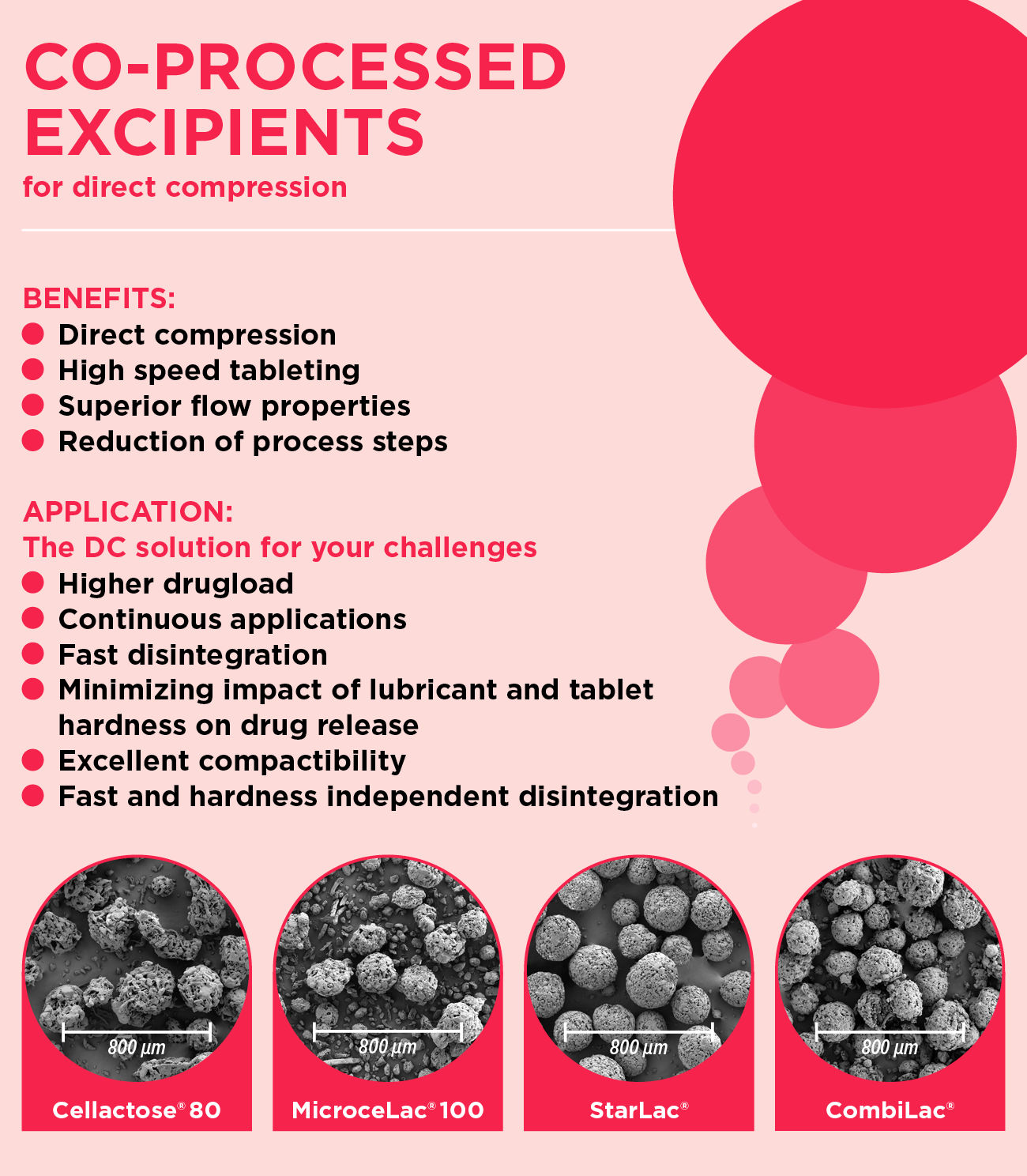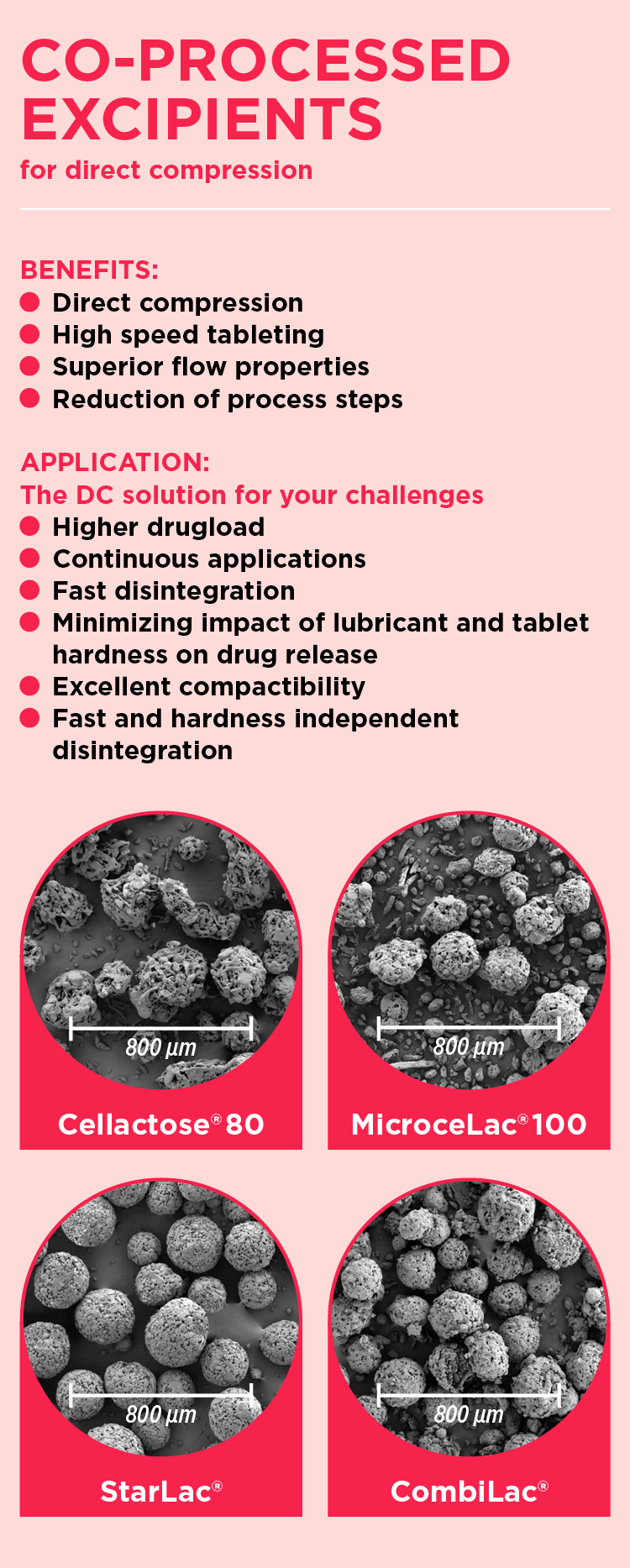Co-processed excipients
MEGGLE has it.
The right co-processed excipients for direct compression
The use of co-processed excipients (CPE) are by far the easiest and fasted way to develop solid oral dosage forms.
The solution: Co-processed excipients
Traditional excipients struggle to cope with current challenges in drug development such as high speed tableting, developing direct compression formulation, low dose related content uniformity issues and insufficient tablet hardness due to high dose loading. Co-processed excipients are in essence the solution to each problem, provided that the right CPE is chosen.
At MEGGLE each CPE was developed having a specific problem in mind, which needs to be solved. Therefore MEGGLE provides a wide range of CPEs. The individual components are of pharmacopoeial quality and are brought together in a sophisticated, controlled manner, resulting in the highest degree of material robustness with regard to their functional related characteristics (FRCs). As quality by design (QbD) gains more and more importance, developers’ need for tightly controlled critical material attributes (CMA) are one of the key benefits of CPEs. The inherent variability of each excipient in a traditional powder blend, which adds up to inherent product variability, can be addressed easily by the use of CPEs, as their manufacturing can be fine-tuned, adding another layer of control, which is impossible to achieve by a simple operation such as blending.
Advantage: Stable ratio of components
Furthermore the ratio of the individual components within the CPE remains stable throughout the entire production process, as these components cannot be separated by physical means. It is important to note that co-processing must not lead to chemical alteration of the individual components.
Important: Full compliance with regularly bodies
Through MEGGLE’s expertise in co-processing, MEGGLE assures full compliance for its CPEs products with regularly bodies around the globe. CPEs are no exception when it comes to its GMP production according to the Joint IPEC-PQG Good Manufacturing Practices Guide for Pharmaceutical Excipients, and USP General Information Chapter <1078>. In addition, MEGGLE provides drug master files for all of its CPE, which can be used in conjunction with drug approval by the FDA. It is MEGGLE’s understanding to support its customers from start, providing the first samples, throughout the whole drug development, registration process, and drug product’s life cycle, to finish.
MEGGLE´s co-processed excipients for direct compression are available under the trade names MicroceLac® 100, Cellactose® 80, StarLac®, RetaLac® and CombiLac®

Information / Sample request:

MEGGLE has it.
The right co-processed excipients for direct compression
The use of co-processed excipients (CPE) are by far the easiest and fasted way to develop solid oral dosage forms.
The solution: Co-processed excipients
Traditional excipients struggle to cope with current challenges in drug development such as high speed tableting, developing direct compression formulation, low dose related content uniformity issues and insufficient tablet hardness due to high dose loading. Co-processed excipients are in essence the solution to each problem, provided that the right CPE is chosen.
At MEGGLE each CPE was developed having a specific problem in mind, which needs to be solved. Therefore MEGGLE provides a wide range of CPEs. The individual components are of pharmacopoeial quality and are brought together in a sophisticated, controlled manner, resulting in the highest degree of material robustness with regard to their functional related characteristics (FRCs). As quality by design (QbD) gains more and more importance, developers’ need for tightly controlled critical material attributes (CMA) are one of the key benefits of CPEs. The inherent variability of each excipient in a traditional powder blend, which adds up to inherent product variability, can be addressed easily by the use of CPEs, as their manufacturing can be fine-tuned, adding another layer of control, which is impossible to achieve by a simple operation such as blending.
Advantage: Stable ratio of components
Furthermore the ratio of the individual components within the CPE remains stable throughout the entire production process, as these components cannot be separated by physical means. It is important to note that co-processing must not lead to chemical alteration of the individual components.
Important: Full compliance with regularly bodies
Through MEGGLE’s expertise in co-processing, MEGGLE assures full compliance for its CPEs products with regularly bodies around the globe. CPEs are no exception when it comes to its GMP production according to the Joint IPEC-PQG Good Manufacturing Practices Guide for Pharmaceutical Excipients, and USP General Information Chapter <1078>. In addition, MEGGLE provides drug master files for all of its CPE, which can be used in conjunction with drug approval by the FDA. It is MEGGLE’s understanding to support its customers from start, providing the first samples, throughout the whole drug development, registration process, and drug product’s life cycle, to finish.
MEGGLE´s co-processed excipients for direct compression are available under the trade names MicroceLac® 100, Cellactose® 80, StarLac®, RetaLac® and CombiLac®
